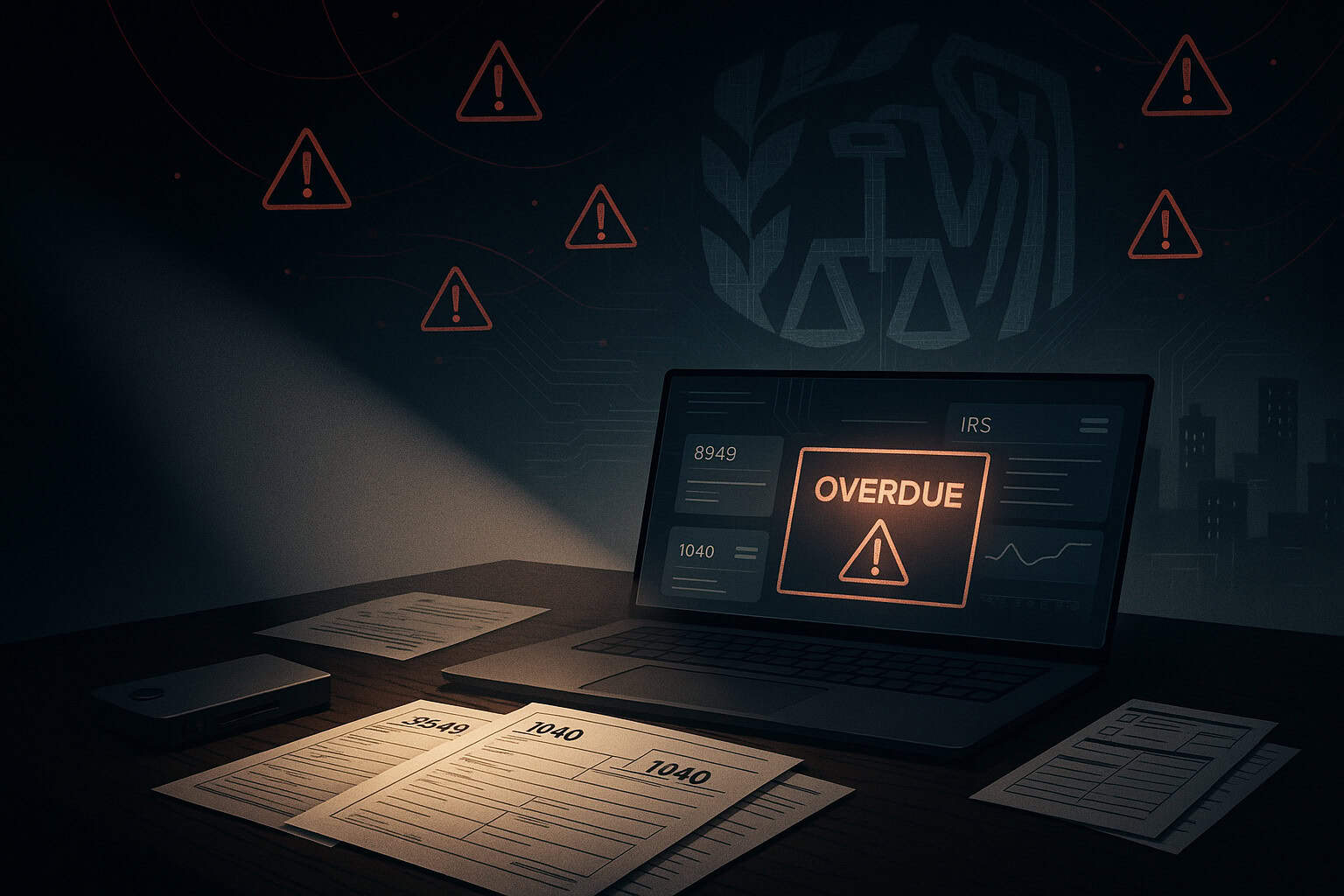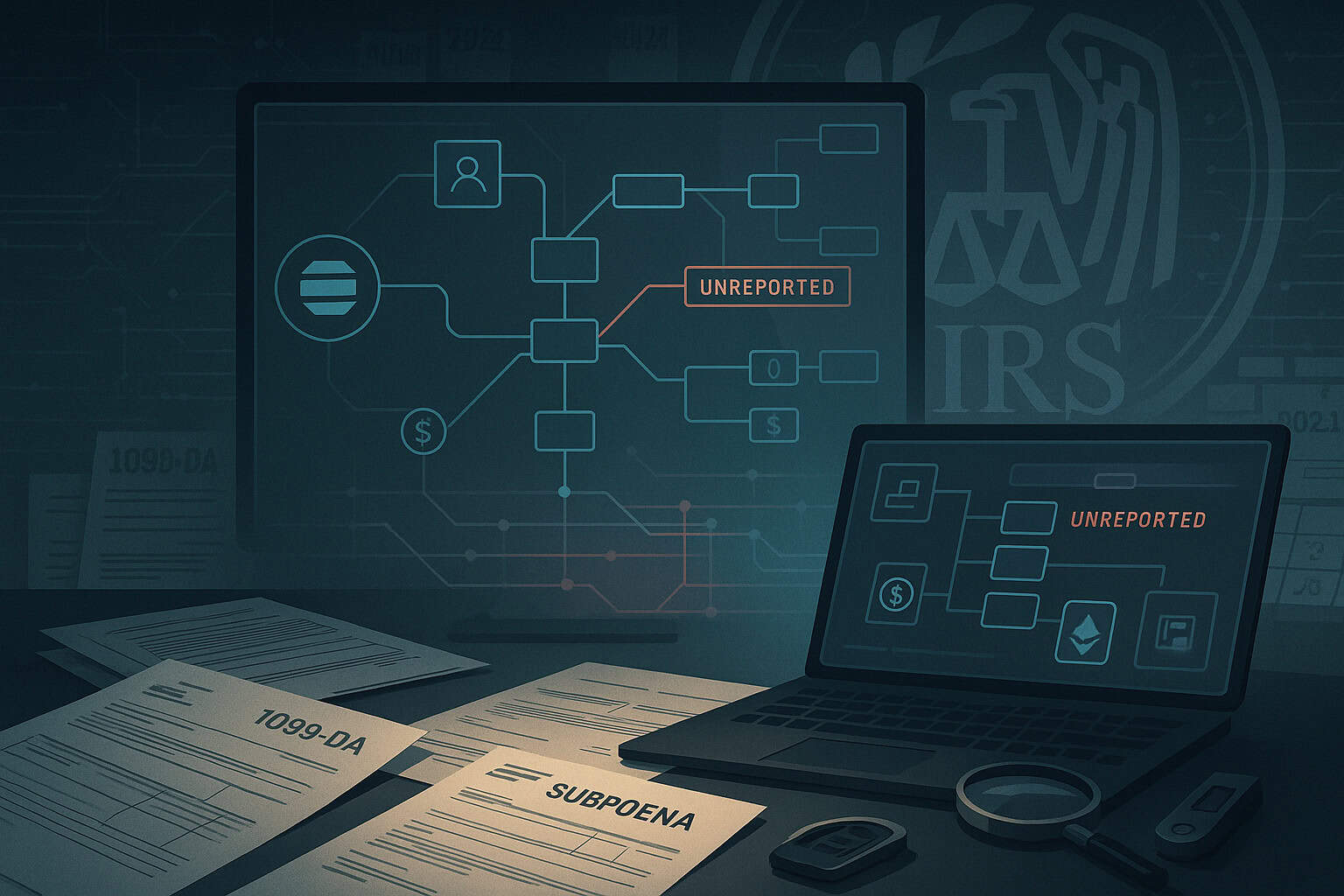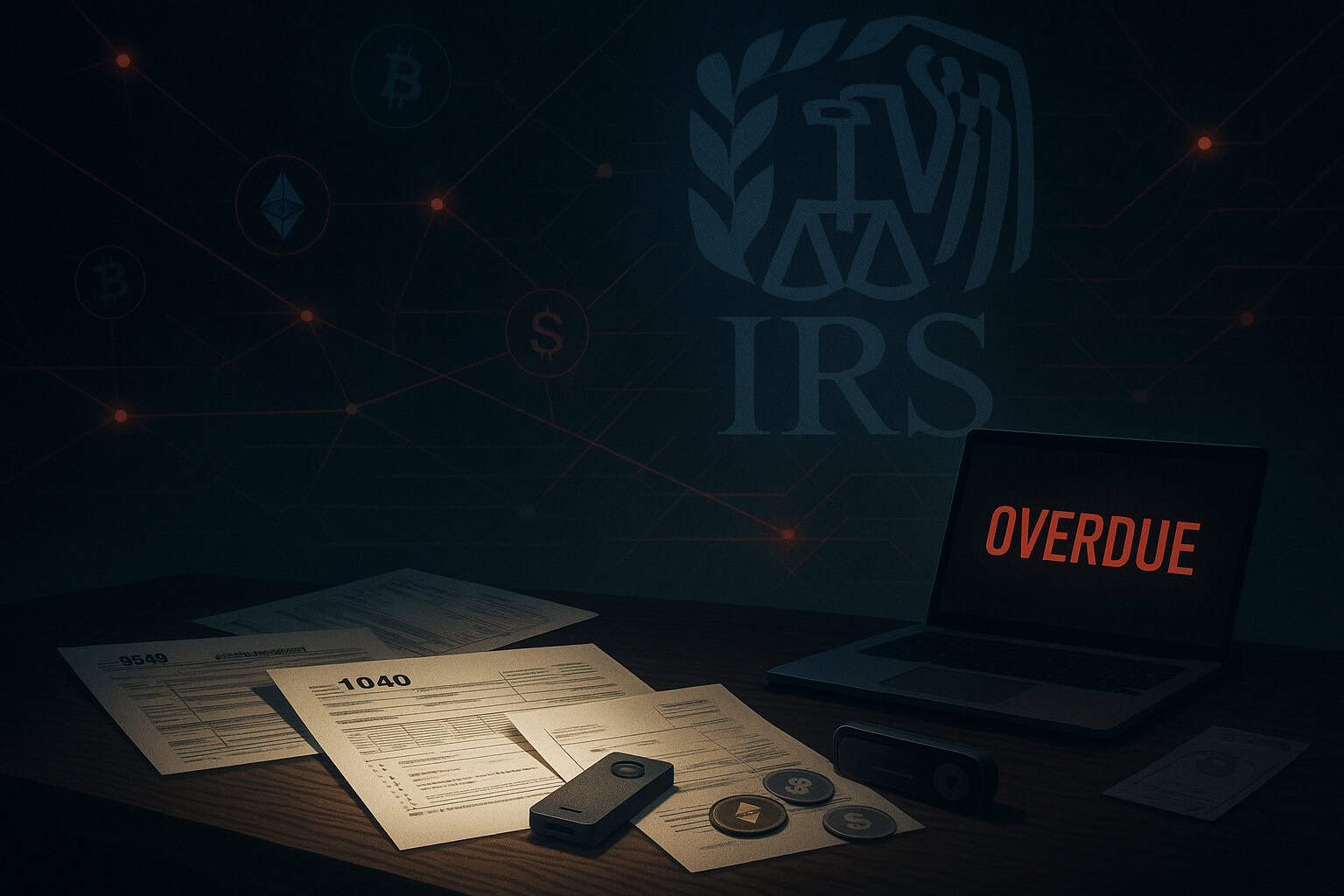Last Updated on September 25, 2025 by Patrick Camuso, CPA
Cryptocurrency has become an integral part of many taxpayers’ financial portfolios, yet filing unfiled tax returns related to crypto activity remains a widespread and serious issue. The IRS is intensifying its scrutiny on unfiled crypto taxes, and failing to report cryptocurrency transactions can lead to severe financial consequences.
These include penalties, interest charges, and even the possibility of criminal prosecution. Understanding the filing requirements and the risks associated with unfiled returns is essential for anyone involved in crypto trading, mining, staking, or other related activities.
If you find yourself with unfiled tax returns related to cryptocurrency, it’s crucial to act promptly to minimize penalties and avoid enforcement actions. This guide will walk you through everything you need to know about filing unfiled crypto tax returns, the risks of ignoring your tax obligations, and how to get back on track with the IRS.
Key Takeaways
-
The IRS is increasing enforcement against unfiled cryptocurrency tax returns.
-
Failure to report crypto income or gains can lead to penalties, interest, and possible criminal charges.
-
Starting in 2025, Form 1099-DA will require detailed wallet-level reporting, boosting IRS transparency.
-
The new reporting requirements will make it harder to conceal unfiled crypto tax returns.
-
Taxpayers with unfiled returns may receive a CP59 notice from the IRS, alerting them about missing filings.
-
There are options available to correct unfiled returns and reduce penalties.
-
Consulting experienced tax professionals or attorneys is highly recommended to ensure compliance and minimize financial risks.
The Growing Risk of Unfiled Crypto Taxes

The risk of leaving cryptocurrency unfiled on your tax returns is growing rapidly. The IRS now employs advanced blockchain analytics tools to monitor cryptocurrency transactions more effectively than ever before. These sophisticated technologies allow the IRS to trace transactions across wallets and exchanges, making it increasingly difficult for taxpayers to conceal crypto activity.
In addition to analytics, the IRS issues John Doe summonses to crypto exchanges and engages in data-sharing agreements with foreign tax authorities. If you have sold, traded, staked, mined, or transacted with NFTs, failing to report these activities can quickly lead to detection. Unlike many other tax issues, IRS assessments related to unfiled returns do not have a statute of limitations until a return is filed. This means taxpayers can be held liable for unpaid taxes indefinitely.
Major cryptocurrency exchanges such as Coinbase, Kraken, and Gemini provide tax forms like 1099-MISC, 1099-B, and soon 1099-DA directly to both taxpayers and the IRS. This direct reporting increases the likelihood that any unfiled tax returns omitting crypto income or gains will trigger audit notices or other enforcement actions.
Many taxpayers mistakenly believe that off-exchange wallets remain invisible to the IRS. However, as
“Blockchain analytics has made that assumption dangerous and costly.” Ignoring your unfiled tax returns related to cryptocurrency can lead to serious consequences.” Patrick Camuso, CPA
Why Reporting Cryptocurrency Is Mandatory
The IRS treats cryptocurrency as property for tax purposes. This classification means that every sale, swap, or disposition of crypto is a taxable event that must be reported on your tax return. Additionally, cryptocurrency received as income, whether from mining, staking, or payment for services, is taxed at ordinary income rates.
Self-employed individuals and business owners who receive crypto payments must report this income on Schedule C as part of their business tax filings. Failure to do so can lead to increased tax liability and penalties.
Starting in 2025, the IRS will require Form 1099-DA, which mandates wallet-level reporting. This new form will significantly increase transparency and make it harder to hide unfiled tax returns related to cryptocurrency.
Ignoring these filing requirements can result in substantial penalties. These include a 20% accuracy penalty on underreported tax, failure-to-file penalties up to 25% of unpaid tax, and fraud penalties that can reach 75% of the unpaid tax balance. Therefore, it is crucial to file your tax return accurately and on time to avoid these costly consequences.
Filing Requirements for Cryptocurrency Taxes: What You Need to Do
To comply with filing requirements for cryptocurrency taxes, taxpayers must calculate the fair market value (FMV) of each transaction at the time it occurs. Sales and exchanges of crypto assets should be reported on Form 8949 and Schedule D, while business-related crypto income must be included on Schedule C.
Maintaining detailed records is essential. This includes keeping track of transaction dates, amounts, wallet addresses, and supporting documentation. Utilizing crypto-native tax software alongside the guidance of a knowledgeable CPA or tax professional can help reduce errors and the risk of audits, ensuring that your tax filings are accurate and complete.
If you have unfiled returns, filing back tax returns could allow you to claim a tax refund, stop penalties, and provide necessary documentation for loans or financial institutions. However, you only have three years from the original tax return’s due date to file your tax return and receive a tax refund. Before filing your past due tax returns, gather all relevant financial records and tax documents to ensure all necessary information is included.
You can also request a transcript of the tax information the IRS has on file for you for any given year in the last 10 tax years by filing Form 4506-T. This can help identify missing tax returns and verify income information.
Consequences of Not Filing Crypto Taxes: Financial and Legal Risks
Failing to file a tax return reporting cryptocurrency activity can trigger a cascade of financial and legal consequences. The IRS may impose a 20% accuracy penalty for underreporting taxes and a failure-to-file penalty that can reach 25% of the unpaid tax. Interest charges accrue daily on any unpaid tax balance, increasing the overall tax debt.
Additionally, the late filing penalty accrues at a rate of 5% of the unpaid taxes for each month the return is late, up to a maximum of 25%. Taxpayers can also lose the ability to claim refunds after three years from the original due date of the return.
In more severe cases, the IRS can assess fraud penalties up to 75% of the unpaid tax and pursue criminal prosecution. Enforcement actions such as wage garnishments, bank levies, and property seizures are common tools used to collect unpaid taxes and compel compliance.
Willful failure to file taxes can lead to potential criminal charges for tax evasion or fraud, though this is relatively rare. The IRS has ten years from the assessment date to collect unpaid taxes, known as the Collection Statute Expiration Date (CSED). Ignoring your tax obligations can also affect social security retirement or disability benefits, especially for self-employed individuals whose benefits depend on reported earnings.
Steps to Correct Unfiled Crypto Tax Returns: How to Get Back on Track
If you have unfiled tax returns related to cryptocurrency, the path to compliance involves several key steps. First, file or amend your returns using Form 1040X to report previously omitted income. You will need to complete missing forms such as Form 8949, Schedule D, and Schedule C, depending on your crypto activities.
The IRS generally prefers that you file all back tax returns for years you have not yet filed. While the IRS can look back indefinitely for unfiled tax returns, it typically enforces non-filing from the last six years to consider taxpayers in good standing. Filing the last six years of returns is generally sufficient to meet IRS requirements and restore compliance.
For employees or contractors paid in crypto, ensure that W-2 or 1099 forms are corrected accordingly. If you hold foreign accounts with cryptocurrency, reporting on FinCEN Form 114 (FBAR) may also be required.
For significant unreported amounts, the IRS Voluntary Disclosure Practice can provide a framework to come clean while minimizing penalties. Failure to file taxes can also impact Social Security benefits for self-employed individuals, as it affects their earnings history.
If the IRS has to file a substitute return for you, it may not include deductions or credits that lower your tax liability, resulting in a higher tax bill. Working with a tax professional or tax attorney experienced in crypto taxation is highly recommended, especially to reconcile complex income sources like DeFi transactions, NFTs, and DAO earnings.
How the IRS Detects Unfiled Crypto Tax Returns
The IRS employs several methods to identify taxpayers with unfiled returns related to cryptocurrency. Blockchain analytics tools such as Chainalysis enable the IRS to trace transactions across wallets and exchanges, revealing hidden crypto activity.
The agency also obtains data directly from exchanges through 1099 forms and summonses. International data-sharing agreements allow the IRS to track cross-border crypto transactions, further tightening the net on non-compliance.
The upcoming introduction of Form 1099-DA in 2025 will provide wallet-level transparency, making it increasingly difficult for taxpayers to hide unfiled taxes. These developments underscore the importance of timely and accurate tax filings.

Expert Advice on Managing Crypto Tax Compliance and Unfiled Returns
Every cryptocurrency transaction is potentially taxable, and maintaining accurate, real-time records is critical to fulfilling your tax obligations. Using the correct IRS forms and addressing any unfiled returns promptly can significantly reduce penalties and interest charges.
Partnering with a crypto-specialized CPA or tax attorney ensures that your tax filings are accurate and compliant with evolving IRS rules. As Patrick Camuso, CPA, emphasizes, “Compliance is no longer optional. The IRS has the tools and the data. Our role is to protect clients through proactive, accurate, and strategic reporting.”
By working with experienced tax professionals, you can navigate the complexities of crypto tax filings, minimize penalties, and avoid enforcement actions such as wage garnishments or bank levies.
Frequently Asked Questions About Filing Unfiled Crypto Tax Returns
Q1: What happens if I don’t file tax returns for my cryptocurrency transactions?
Failing to file tax returns for cryptocurrency can lead to penalties, interest charges, and the IRS filing a substitute for return (SFR) on your behalf, which may not include deductions or credits you are eligible for. This can increase your tax liability and trigger enforcement actions such as wage garnishments or bank levies.
Q2: How far back can the IRS go to assess unfiled crypto taxes?
The IRS can look back indefinitely for unfiled tax returns, but typically enforces non-filing for the last six years. However, there is no statute of limitations on tax assessment until a return is filed, so it’s important to file all missing returns to avoid ongoing liability.
Q3: Can I still claim tax refunds on unfiled crypto tax returns?
You can claim tax refunds only if you file your tax return within three years of the original due date. After this period, you forfeit the right to any refunds or tax credits for that year.
Q4: What documents do I need to file back tax returns for cryptocurrency?
Gather all relevant financial records including wage and income transcripts, Form 1099s from exchanges, transaction histories, and records of crypto sales, trades, staking, or mining income. You can also request income transcripts from the IRS using Form 4506-T.
Q5: What penalties apply if I file my crypto tax returns late?
The IRS assesses a failure-to-file penalty of 5% per month on unpaid taxes up to 25%, and failure-to-pay penalties of 0.5% per month up to 25%. Interest also accrues on unpaid taxes until the balance is paid in full.
Q6: How can I minimize penalties on my unfiled crypto tax returns?
Filing your past due return as soon as possible helps minimize penalties. You may also qualify for first time penalty abatement or reasonable cause penalty relief. Working with experienced tax attorneys or tax professionals can help negotiate penalty abatements and installment agreements.
Q7: Will filing unfiled crypto tax returns affect my Social Security benefits?
Yes, for self-employed individuals, filing accurate returns reporting crypto income ensures proper earnings are credited to the Social Security Administration, affecting your retirement and disability benefits.
Q8: Can the IRS criminally prosecute me for not filing crypto taxes?
While criminal prosecution for willful tax evasion is possible, it is relatively rare. Most cases are resolved through civil penalties and payment plans, but it’s important to file and pay taxes owed to avoid this risk.
Q9: Where can I find the correct tax forms to file back crypto tax returns?
You should use the IRS website to download tax forms for the specific years you are filing, including Form 8949, Schedule D, Schedule C, and Form 1040X for amended returns if needed.
Q10: How do I get help with filing unfiled crypto tax returns?
Consulting experienced tax professionals, such as crypto-specialized CPAs or tax attorneys, can guide you through the filing process, help gather necessary documents, and negotiate with the IRS to reduce penalties and set up payment plans.
Resolve Your Unfiled Crypto Taxes with Expert Help Today
If you have unfiled crypto taxes or concerns about your tax filings, don’t wait to seek expert help. Contact Camuso CPA today for a confidential compliance review. Their crypto-native expertise ensures accurate filings, effective penalty reduction strategies, and peace of mind as you resolve your tax issues.
Tax relief services can also assist taxpayers in reducing or managing their tax liability, providing additional support for those facing significant tax challenges. These services negotiate with the IRS on behalf of clients to lower penalties, set up payment plans, and explore settlement options like Offer in Compromise.
If you owe taxes or have a large unpaid tax balance, professional assistance can help you navigate installment agreements or request penalty abatement, including first time penalty abatement where applicable. Don’t let unfiled returns or unpaid taxes jeopardize your financial future, take action now to file your tax return and regain control of your tax obligations.
Schedule Your Crypto Tax Consultation
Filing unfiled tax returns related to cryptocurrency is essential to avoid escalating tax debt, penalties, and enforcement actions. With the IRS’s growing focus on crypto compliance, staying informed and proactive is the best strategy to protect your financial well-being.






